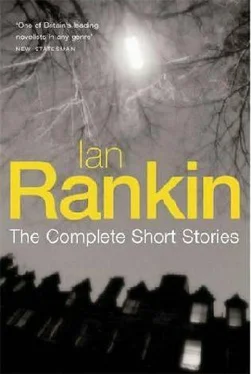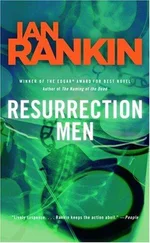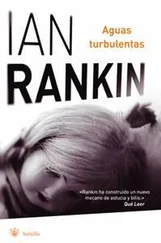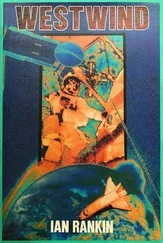I suppose, looking back, my schooldays were to blame. Or maybe it was my parents’ genes, which had left me the smallest boy in my year. The popular boys all seemed to be the tough ones, the sporty ones, the ones who weren’t shy, who were good-looking.
I didn’t really fit the bill. So instead I became the comedian. Of course, they weren’t laughing with me – they were laughing at me. I knew it even then, as I told my jokes and made my silly faces and did my funny walks. They told me I was off my head, said I was potty. I didn’t mind: at least they were talking to me. At least they were noticing me.
Which meant I was allowed to participate in their games, or at least watch from the periphery, which was my favoured spot anyway. Watching them, I was able to learn. I learned which kids and teachers I could make fun of. I’d go for the younger kids, even spottier and uglier than I was, or for one of the unlovely girls who stood by the playground railings, sad looks on their faces. Oh, I was ferocious with anyone who couldn’t bite back. It was how I stayed part of the gang.
The other problem was, I wasn’t stupid, but when I became a member of Black Alec’s gang, I had to pretend to be less clever than I was. And this pretence could only be carried off if I started slipping in class, answering questions wrongly when I knew the right answers, my test marks dropping. The deputy head had a word with me. I think she could see there was a problem, she just couldn’t figure out what it was. My parents were summoned to the school for a discussion. They started to take notice of me too, helping with homework and revision. Still I refused to fulfil my potential. Sometimes I would slip up, and answer some question which had stumped everyone else. At these times, the teacher would peer at me, wondering what was going on.
Eventually I was taken to hospital for tests on my brain. They glued all these electrodes to my head. Three washings later, my hair still felt sticky, and the results had failed to throw up any incongruities. When the final exams came, I was in a quandary. We’d all have left school by the time the results were posted. So if I wanted to, I could do as well as I liked. But something made me stay in character; maybe it was the thought that though I was leaving school, the gang would still be there, hanging around their favoured street corner, yelling abuse at cars and pedestrians, running down to the park with a carrier-bag of beer. It was a community I understood, and my chosen role made me unique within it. I was ‘Joker’ or ‘The Comedian’. I wasn’t expected to take part in the occasional massed battles with other gangs. I proved myself by telling jokes and stories, by deriding other gangs (especially with reference to their personal hygiene and sexual habits), and by improving my range of impressions.
Soon after leaving school, however, I found that a lot of the gang had drifted away. Even Black Alec – our leader and mentor – had gained employment as a car mechanic. The merry band had dwindled to a few losers for whom the daily stint at the street corner had become an unwelcome chore. I thought about resitting my exams, going on to college or university. But Black Alec was my next-door neighbour: how could I tell him my plans? He wouldn’t have understood. He’d have asked me to do the walk again, and afterwards his laughter would have had me craving more. More laughter, more acceptance, more of his approval.
Anyway, things didn’t work out for him as a mechanic. He became a bouncer instead, working at a discotheque in Kirkcaldy. He got into trouble, spent a couple of months in jail, and when he came out he told us he’d just paid a visit to the ‘University of Life’. From now on, he said, nothing would be beyond him. He’d only be satisfied with ‘number one’. At the time, I don’t think we really knew what he was talking about, but we found out soon enough.
I went to work in a chicken factory. It wasn’t a bad job. The production line was mostly staffed by women, and I kept them smiling. I’d sing a song, do a little dance, whatever it took to please them. They were all married, kept asking me when I’d find a girlfriend. They wore white overalls and green wellies, their hair tucked into white caps. Sometimes, when I met them outside the factory, I wouldn’t recognise them. My first Christmas party was a revelation. They were wearing dresses and make-up, having a drink and a laugh. We’d taken over the back room of a pub in Glenrothes. No management, just workers. There was some entertainment. A couple of the women sang songs. One of the foremen got up and told some jokes.
‘Get off!’ the women yelled at him. ‘Our comedian’s ten times better than you!’ They meant me. I was cajoled, persuaded. I found myself up on the stage, microphone in hand. I cleared my throat, cleared it some more, the sound filling the room. Someone called out for me to get on with it, and then somebody else twigged that I was pretending to be the production supervisor: he was always clearing his throat before he gave you bad news. There was scattered applause and laughter.
‘I’m sorry to have to inform you all’, I said, ‘that Christmas has been cancelled this year. You lot might not be happy, but I’ve two thousand capons in the back who’re over the moon.’
Now everyone understood; they’d all clicked into my act. And it felt wonderful. The hair on my arms was standing up. It seemed I’d been up there a couple of minutes, but I was told afterwards I’d done a twenty-minute set. Women were kissing me, telling me I was the best.
‘You should turn professional,’ one of them said.
And eventually, plucking up courage, that’s just what I did.
I started out at pub talent nights, winning a couple of contests. The publican might then invite me back for a three- or four-week run. I kept up the factory job, but now I had a girlfriend, Emily, who’d sung ‘The Night They Drove Old Dixie Down’ at one of the talent shows. I’d asked her about the song. She’d no idea what it was all about.
‘Just got it from one of my mum’s Joan Baez albums.’ We had a laugh together. Emily had a day job, too, in a shoe shop. She came up with the idea of me going full-time pro. She said she’d support me till I got rich and famous. She said it wouldn’t take long. Her argument was that with my job, I’d no time to write new material. She was right: I really needed new material. So she became my manager, finding me bookings, and I lay in bed writing jokes and stories.
It all went well for a while. Then we realised I was just treading water. It was still pubs and clubs.
‘You need a portfolio,’ Emily said. ‘Something you can show to agents and the TV companies.’
‘What I need are some decent gags,’ I replied.
The writing wasn’t working. It was never how I’d worked. I was spontaneous, my material came from life. Now that I spent all day mooching around the house, there was nothing for me to write about. If the act was going to go anywhere, I needed to take a few risks. And that was what I did. I invested in a tape machine and other electronic stuff, so I could use funny noises and sound effects in my act. Then I got measured for a sharp suit – blue and sparkly, with shirt to match. I looked ridiculous in it, but then that was the point, wasn’t it?
I now looked the part. Problem was, none of it came cheap. Emily asked where I’d got the money.
‘Savings,’ I told her, lying through my teeth. Soon enough, I knew as I said it, I might not have any teeth left to lie through. Because I’d borrowed the money from Black Alec.
Black Alec had almost fulfilled his ambition of becoming ‘number one’. He was now one of the most feared men on the east coast. He ran a string of clubs in Fife, owned two pubs in Edinburgh, and had so many fingers in so many other pies, it was a wonder he could pick his nose. He also ran protection, prostitutes and pornography – or so the rumours said. I’d never worked in any of his clubs – he said they were ‘upmarket’, ‘mostly music-oriented’. He said I was low-class.
Читать дальше












